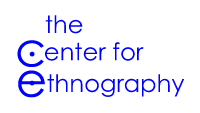
an
interdisciplinary
campus center
THE ETHNOGRAPHY OF/AS COLLABORATION
Collaboration has long been valorized as a presumed virtue or good in a liberal culture of achievement amply rewarding the individual. Here we do not have in mind merely the reinforcement of this longstanding collateral virtue or good. Rather collaboration here stands for the various forms and norms of collective effort , new and old, that are reshaping ways of knowing, and getting things done across a diverse array of activities and sites, the university being only one, but a self-referential one for us. New communication and information technologies are a driving force in this, but there are interesting ideological shifts going on at the heart of work arrangements, political alliances, social movements in many settings for which something as virtuous as collaboration stands. We suggest that looking inside the contemporary forms of this liberal good, through ethnographic inquiry, will show us one of the most important current 'structural' aspects of neoliberalism, globalization, emergence, etc. Ethnography has been particularly good at analyzing the ligaments of relationships of collectivity in the past, and is a good instrument for doing so now.
At the same time, ethnography itself, most often associated with the lone wolf investigator entering communities of others, is challenged by this culture of collaboration. It is often no longer enough to arrive in a scene of fieldwork and improvise collaboration in the traditional, subnormative way. The scenes of fieldwork today only become defined by already being embedded in networks of relations that are easily glossed as 'collaborative.' As such, ethnography does not have the explicit norms of method and practice to express its own present conditions. Under this theme, we will thus want to also track efforts at redefining the basic practices of ethnography in the direction of organizing it in relation to norms of collective and collaborative research, as well as either resisting or conforming to the ideological contemporary senses of collaboration that represent the forms by which activities of various sorts become integrated into the operations of bureaucracies.
The authority of the ethnographer is thus the authority of some collaborative. How does the latter take shape? Collaboratories or established collaborative relationships are cocoons after all for highly particularistic materials from ethnography, still associated with individual insight and effort. Collaborative norms give such ethnography purchase, confidence, and legitimate identity in a world for which collaboration is not just an eternal good but an evolving modality covering diverse emerging schemes and collective efforts of unclear boundaries.
Under such conditions, what of the traditional ethos, aesthetics, and distinctiveness of ethnography will remain? So, here, we propose that we look both at ethnographic efforts to understand new arrangements in the ideological name of collaboration and at the changing conditions of ethnographic authority, identity and possibility moving in the same direction, apparently.



